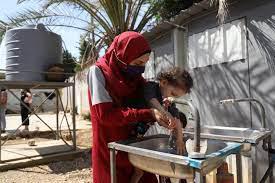
The public water system in Lebanon is “on life support” and could collapse at any moment, putting 71 per cent of the population, or more than four million people, at immediate risk of losing access to safe supply, the UN Children’s Fund, UNICEF, warned on Friday.
Most water pumping will gradually cease in the next four to six weeks, the agency estimated, due to the escalating economic crisis and shortages in funding and supplies, such as chlorine and spare parts.
‘Squeezed to destruction’
A collapse could lead to water prices rising by 200 per cent a month as families rush to secure alternative or private suppliers.
“The water sector is being squeezed to destruction by the current economic crisis in Lebanon, unable to function due to the dollarized maintenance costs, water loss caused by non-revenue water, the parallel collapse of the power grid and the threat of rising fuel costs,” said Yukie Mokuo, UNICEF Representative in the country.
“A loss of access to the public water supply could force households to make extremely difficult decisions regarding their basic water, sanitation and hygiene needs,” she added.
High levels of vulnerability
A UNICEF assessment based on data from Lebanon’s four main public utility companies revealed that more than 70 per cent of people are now living with “highly critical” and “critical” levels of vulnerability.
Nearly 1.7 million people have access to just 35 litres a day, compared with the national average of 165 litres prior to 2020, or a nearly 80 per cent decrease.
Additionally, public water utility providers can no longer afford essential spare parts, while the price of bottled water has doubled over the past year.
"At the height of the summer months, with COVID-19 cases beginning to rise again due to the Delta variant, Lebanon’s precious public water system is on life support and could collapse at any moment,” Ms Mokuo said.
Urgent action needed
UNICEF requires $40 million a year to secure the minimum levels of fuel, chlorine, spare parts and maintenance necessary to keep critical systems operational.
Ms. Mokuo underscored the need for urgent action as facilities such as schools and hospitals will not be able to function, and millions will be forced to resort to unsafe and expensive water sources.
“The immediate adverse effect would be on public health,” she said. “Hygiene would be compromised, and Lebanon would see an increase in diseases. Women and adolescent girls would face particular challenges to their personal hygiene, protection and dignity without access to safe sanitation.”
UNICEF works with public water supply providers to reach the most vulnerable children and women in Lebanon, and supported delivery of safe water to communities during the pandemic.
“We will remain steadfast in our support to communities as resources permit, but this alarming situation requires immediate and sustained funding,” Ms. Mokuo said.
“UNICEF stands ready to support, particularly as the global pandemic evolves, to ensure that the most basic right to clean water is met for children and families at this critical time for Lebanon.”
Widespread crisis
According to figures from the World Bank last month, Lebanon is living through one of the world’s three worst financial and political crises since the mid-19th Century. Its currency has lost more than 90 per cent of its value since late 2019, and its GDP has fallen by some 40 per cent since 2018.
Last week, the UN Special Coordinator for Lebanon, Joanna Wronecka, expressed deep regret over the inability of Lebanon’s leaders to reach agreement on the formation of a new government, adding that it was urgently needed to address the country’s numerous challenges.
She called for swift measures to ensure the designation of a new Prime Minister, in line with constitutional requirements, and the formation of a Government able to undertake the necessary reforms to put Lebanon on the path to recovery ahead of free and fair elections next year
Source: UN
https://news.un.org/en/story/2021/07/1096312
 FR
FR EN
EN AR
AR








